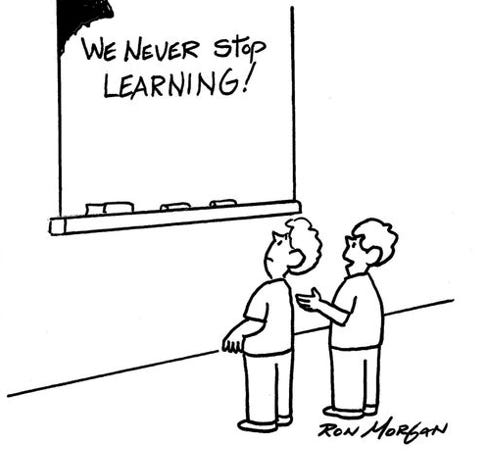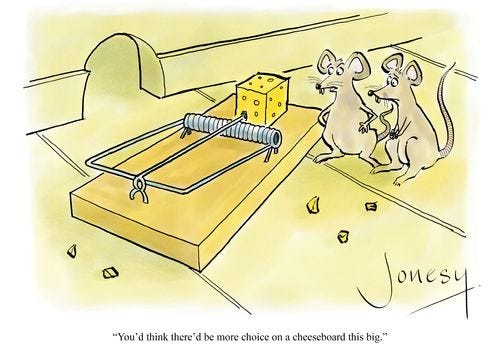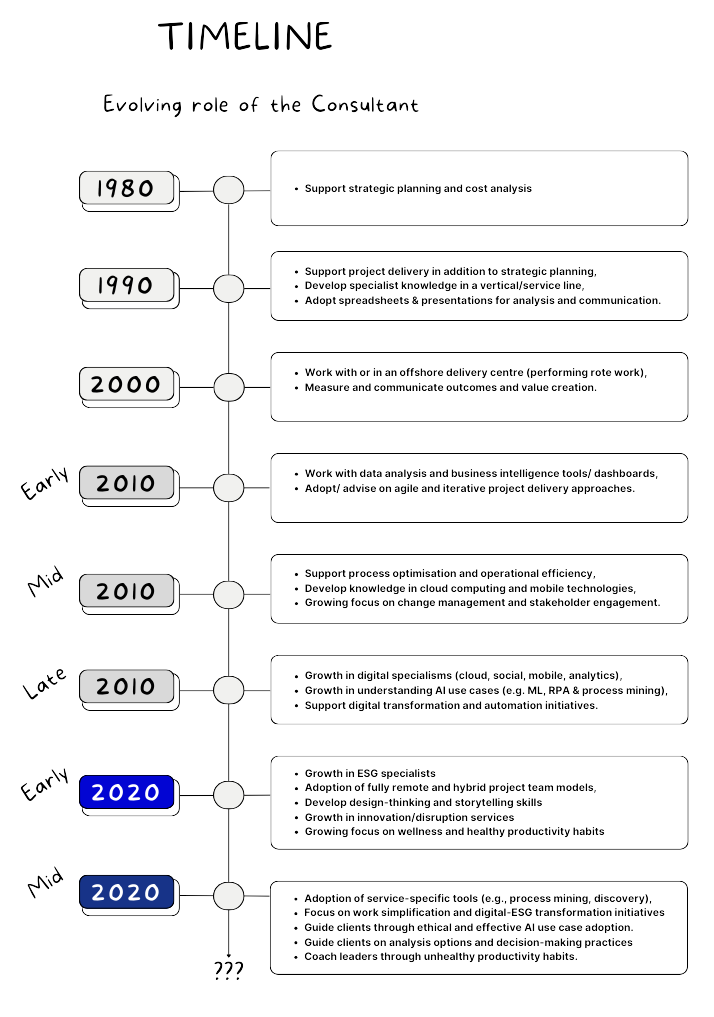How will the role of a management consultant evolve in the near term?
A question we were asked a few months ago...
How will the role of a management consultant evolve over the next 2-5 years?
At the start of 2024, we sat down with the TMC substack to discuss how consulting may evolve in the AI era.
Our view is based on our experience in large firms, boutiques and in-house. From grads to director and management roles. As well as our experience building an AI tool that consulting firms use in their discovery work.
The first article explored what profound change in consulting might mean. This article looks at the impact on roles.
What changes?
For the foreseeable future, the purpose of a consultant will remain the same. To educate, advise, and support clients to:
Ask questions, and answer them.
Make decisions, and act upon them.
In his book (The Inevitable), Kevin Kelly posits that answers have become cheap. The real value is in asking better and more timely questions.
AI and other technologies give us a (growing) ocean of data and an (improving) ability to easily scoop out answers. This allows for faster cycles of question-answer problem-solving to tackle complex, system-wide challenges.
Great.
Consultants have always seen their role as introducing, preparing, performing or stewarding clients through such a process.
The change is in how services are performed (i.e., tasks & information flows). With the emphasis on the consultant to:
Operate at the speed and impact that clients expect.
Deliver more tangible outputs.
Help clients become more data-driven in their decision-making
Speed & Impact
“Historically, clients see technology-enabled delivery as a way to reduce input time, resources... and prices. But over time—opinions shift. Clients recognise they get a better quality of solution/service and are more willing to pay for it. This is already playing out for AI-enabled service delivery. 85% of clients said they would pay more; 25% would pay significantly more. “
- Source Global Research.
Buyers of consulting have (largely) realised they can't jettison their favourite management tool just yet.
Instead, they will expect more accuracy and impact from consulting work e.g. faster data discovery and greater recycling of past consulting work.
Tangible outputs
We’ve come a long way since the 100+ page report.
It’s still around, lurking in the shadows, and those dustier firms.
But in general, clients have changed, and so have their expectations of what they should be receiving.
Namely, more variety.
From reports to slides to spreadsheets.
From posters to infographics to animations and videos.
From living knowledge sets to process/task/journey mining, to digital twins etc.,
The role of the consultant remains to understand the best options they can use to efficiently deliver and output their service (in a given context). Demonstrating the value of their unique service (beyond traditional metrics and vague words).
This will require all those skills core to the profession i.e., listening, critical thinking and analysis, problem-solving and self-management (active learning, resilience, stress tolerance and flexibility). These skills are receiving even more prominence in the AI era (World Economic Forum’s Future of Jobs Report).
School of data-driven decision-making
83% of CEOs want their organisations to be more data-driven.
- 2021 IDC survey (sponsored by Tableau).
Companies are awash with data.
Despite millions spent on BI solutions, most companies struggle to action their quants and numbers. The answer isn't just another, better dashboard.
Decisions need qualitative insights to give context and meaning. These insights take time to gather, interpret and validate. Hence the call for consultants.
Not only to be convenient scapegoats!
But to ask the questions that extract the quals necessary to make sense of the quants. Then to show them how.
This need continues with AI. Especially with AI.
As Large Language Models (LLMs) improve, qualitative insights become accessible at scale. The result of better retrieval mechanisms, larger context windows and better application wrappers.
"…where an LLM draws from the company's content, specific jargon and the user's specific context. This the holy grail— to create more refined and tailored outputs to your particular use case."
- Andreessen Horowitz
This will impact all phases of a project (assess, design, build, deliver, review).
The role of the consultant will be to use the more reliable and accurate data surfaced by their AI-enabled tool. To craft and validate insights quickly. Opening the door to more insight-led discovery, delivery, stakeholder engagement etc.
Closing thoughts
In short, the next 2-5 years will be a spread of bets for consultants.
A push to better understand why clients buy, and to profoundly rethink how work is delivered. And the skills required to do so.
Luckily, the profession is familiar with the idea of change…
In a future newsletter, we will cover the last question we were asked i.e., ‘What will this mean for clients’?
But for now, let us know your thoughts in the comments.



